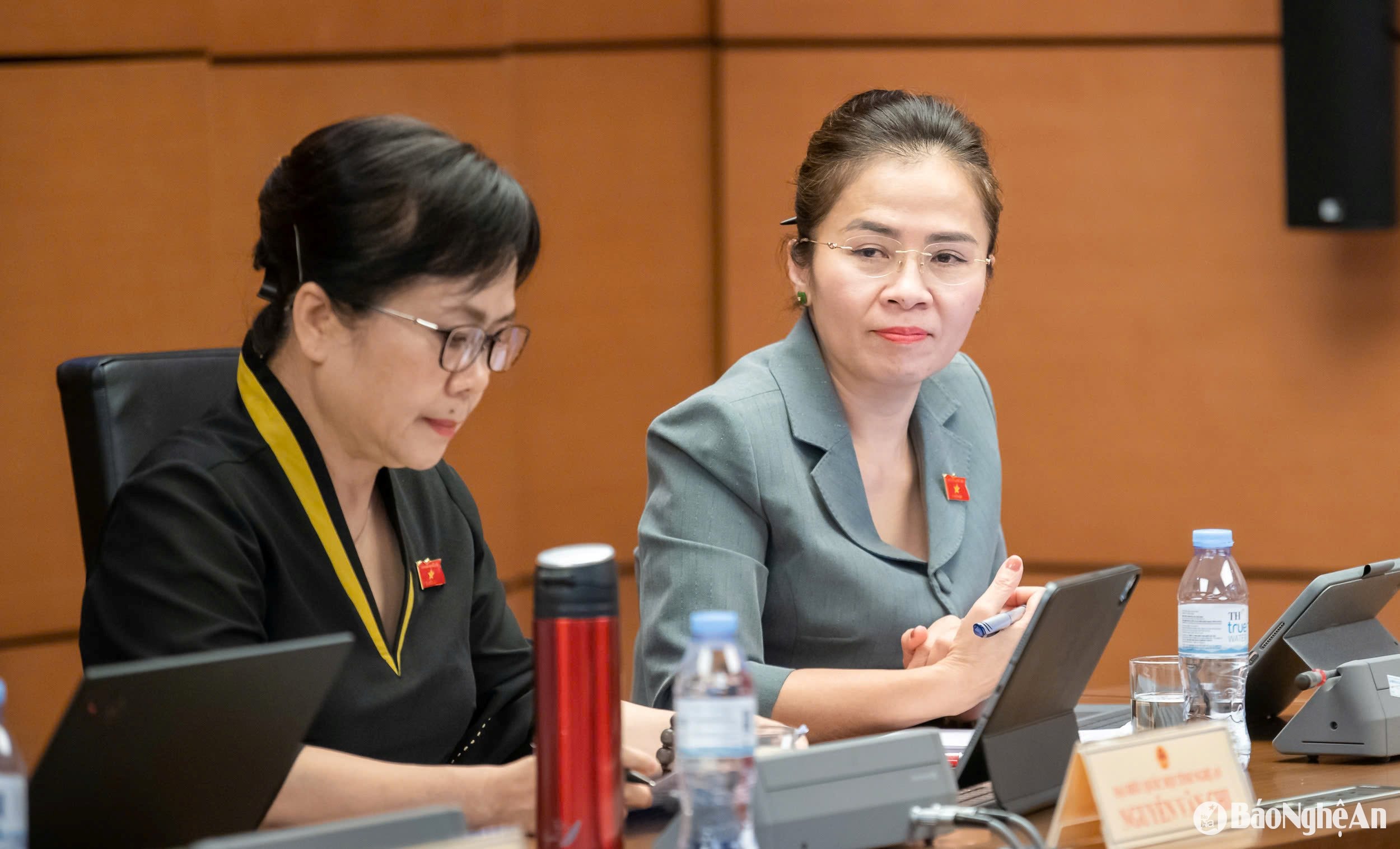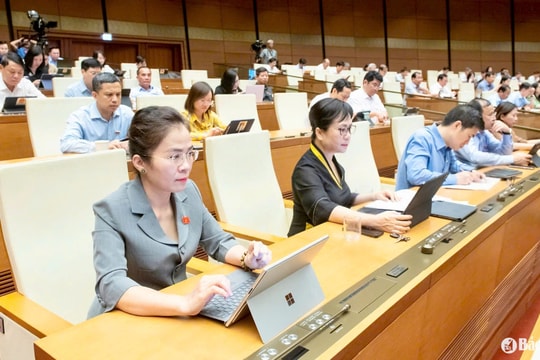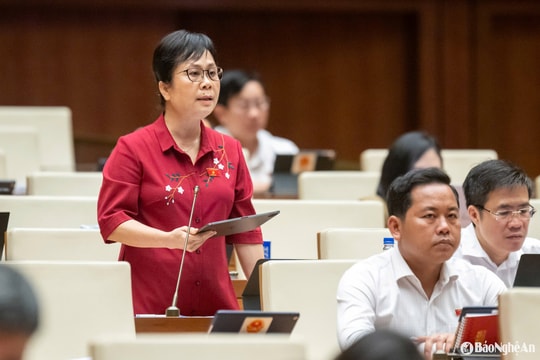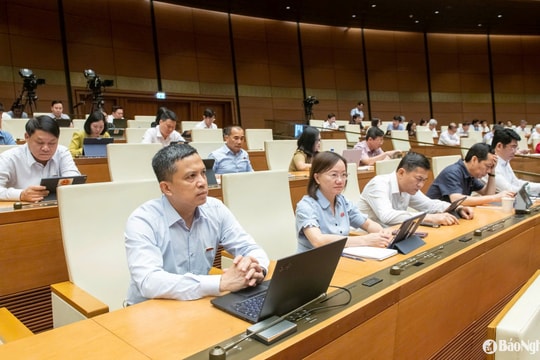National Assembly delegates from Nghe An delegation proposed to promptly carry out comprehensive amendments to the Enterprise Law.
On the afternoon of May 10, at the group discussion session on a number of draft laws for amendment, National Assembly delegates from Nghe An emphasized the need to comprehensively amend the Enterprise Law to institutionalize major policies on private economic development.
.jpg)
Many major policies have not been institutionalized yet.
Discussing the Draft Law amending and supplementing a number of articles of the Law on Enterprises, delegate Hoang Minh Hieu-The member, who is a full-time member of the National Assembly's Committee on Law and Justice, commented that this draft Law mainly focuses on two contents including regulations on anti-money laundering and private bond issuance.
He expressed his agreement with this amendment, especially emphasizing the importance of strengthening anti-money laundering in the context that Vietnam is being put on the enhanced monitoring list (gray zone) by the Financial Action Task Force (FATF).

The delegate from Nghe An analyzed: Being put in the gray area has a big impact on the investment environment and FDI attraction, so it is necessary to amend related legal regulations, including the Enterprise Law; at the same time, he said that many other laws, such as the Penal Code, are also being amended to tighten regulations on preventing and combating money laundering.
Although agreeing with the urgent amendments, delegate Hoang Minh Hieu said that it is necessary to promptly carry out comprehensive amendments to the Enterprise Law. The reason is that this law plays a key role in creating a legal environment for the private economy to develop. He cited lessons from the 2000 Enterprise Law, which, when it was enacted, created a great driving force for the development of the enterprise system.
He pointed out that Resolution 68 of the Politburo on private economic development sets out many strong reform goals, such as reducing 30% of administrative procedures, strongly shifting from "pre-inspection" to "post-inspection", but these contents have not been reflected in this draft law. Therefore, he suggested that the Government soon submit a plan to amend the Enterprise Law in general to fully institutionalize major policies.
.jpg)
Giving specific comments on the draft, delegate Hoang Minh Hieu suggested clarifying the concept of “beneficial owner” of an enterprise, an important content in preventing and combating money laundering. According to him, the current regulations are still general, not clearly stating the ratio of charter capital ownership to be considered a “beneficial owner”. Meanwhile, international practice often determines this ratio to be 25%.
He also noted that requiring all businesses, including small and medium-sized enterprises, to declare information about beneficial owners could create unnecessary pressure. Therefore, it is necessary to distinguish the subjects of application to avoid creating a burden on small-scale businesses with low risk of money laundering.
Regarding the act of "falsely declaring charter capital", delegate Hoang Minh Hieu said that the draft needs to clearly stipulate the time frame for capital contribution to avoid newly established enterprises that have not yet contributed enough capital being considered as falsely declaring, causing legal risks.
Regarding the conditions for private bond offerings, delegate Hoang Minh Hieu agreed with the regulation restricting non-public companies from issuing bonds if their liabilities exceed 5 times their equity. However, he suggested reconsidering this ratio so as not to affect the ability of enterprises to mobilize capital, especially in the context of a difficult bond market.
The delegates also requested the drafting agency to review the subjects of civil servants allowed to contribute capital and establish enterprises. The draft currently only allows civil servants working at public higher education institutions. Meanwhile, Resolution 193 of the National Assembly stipulates that this subject is extended to include management officials at public science and technology organizations. Therefore, it is necessary to review and supplement the subjects to fully institutionalize Resolution 57 of the Politburo on breakthroughs in science and technology development, innovation and national digital transformation.
.jpg)
Commenting on the Draft Law on amending and supplementing a number of articles of the Law on Planning, delegate Hoang Minh Hieu expressed his agreement with the above opinions and proposed to review the consistency between the Law on Planning and other specialized laws such as the Law on Real Estate Business and the Law on Urban and Rural Planning.
The delegate of Nghe An delegation analyzed: when developing planning, there are regulations that refer to urban classification and all are based on that as a basis for implementing regulations related to land and real estate management. For example, the Law on Real Estate Business only allows the subdivision and sale of land plots in urban areas of type III or lower, but in reality, the arrangement of administrative units has made determining urban classification complicated. Therefore, there needs to be appropriate transitional regulations when from July 1, 2025, the 2-level local government model (province, grassroots) is officially applied, without organizing the district level.
He also emphasized that amending the Law on Urban and Rural Planning is necessary, because currently this law does not regulate commune-level planning, but mainly district-level planning, while the new administrative organization model from July 1, 2025 no longer has district level, but only commune level.
Concerns about the proposal to establish a Fund to promote the use of energy economically and efficiently
Mr. Pham Phu Binh - Member of the National Assembly, full-time member of the National Assembly's Committee on National Defense, Security and Foreign Affairs, representative of Nghe An delegation, expressed his agreement with the opinion of the previous delegate on the necessity of amending and supplementing the Law on Enterprises to institutionalize the spirit of Resolution 68 of the Politburo on private economic development.
However, according to delegates, the draft Law being revised focuses on a number of urgent contents, mainly to deal with Vietnam being put on the grey list, at risk of being blacklisted in anti-money laundering. Meanwhile, if we want to truly promote sustainable business development, we need to consider comprehensive amendments and have a longer-term vision.
.jpg)
Giving specific comments on the draft Law amending and supplementing a number of articles of the Law on Enterprises, related to the interpretation of the term “legal status of enterprises”, the delegate said that the current listing is unreasonable. “The first status listed is “temporarily suspended from business”, while “in operation” is listed last. This presentation is not logical. According to him, it is necessary to rearrange it according to the logic of showing the activities of enterprises from formation, operation, encountering difficulties, and handling.
Another notable point is that the draft has not clarified the legal status of enterprises that are temporarily insolvent. Currently, enterprises falling into this situation are being adjusted by the Bankruptcy Law. However, according to the delegate, this is not appropriate because not all cases of insolvency lead to bankruptcy.
He cited that in many countries, the law has specific provisions for businesses facing temporary financial difficulties, aiming to support businesses in recovery instead of speeding up bankruptcy procedures. Before reaching the final step of bankruptcy, there should be a recovery approach, helping businesses solve cash flow difficulties, while protecting the rights of employees, creditors and related parties.
From there, he recommended adding the status of "temporary insolvency" to the system of legal statuses of enterprises, and moving towards amending the Bankruptcy Law, including its name, to clearly demonstrate the priority orientation of supporting enterprises to recover, develop, and operate healthily.
In the second content related to the Draft Law on amending and supplementing a number of articles of the Law on Economical and Efficient Use of Energy, delegate Pham Phu Binh expressed concerns about the proposal to establish a Fund to promote economical and efficient use of energy. He said that currently, according to the current law, there are many preferential capital sources and support programs for businesses in this field, such as: Environmental Protection Fund, National Technology Innovation Fund, Vietnam Development Bank and related national programs.
Delegates said that, without a full assessment of the actual effectiveness of current programs and funds, the establishment of a new fund needs to be carefully considered.
He also noted that the establishment of the Energy Efficiency and Conservation Fund is expected to use the budget as seed capital, then mobilize social capital and ODA. However, Vietnam has now "graduated from ODA", so the ability to access this source of capital is no longer as favorable as before. "Current ODA is mainly loans with interest rates approaching commercial, so it is difficult to consider it an effective source of support", he stated his opinion.
From there, delegate Pham Phu Binh suggested considering establishing a new fund, instead focusing on reviewing and improving the effectiveness of existing support mechanisms, and at the same time researching and adding tax incentives or specific financial support policies to encourage businesses to use energy economically and efficiently.




